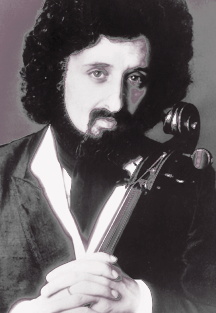

[ Metro | Metroactive Central | Archives ]
Mellow Cello
Symphony guest artist Mischa Maisky offered a moving tribute to Schumann's genius
By Philip Collins
The sublimely intimating melodies of Robert Schumann's music are embraced and savored the world over, yet few performers prove capable of tapping into the core of this composer's musical wellspring. Count cellist Mischa Maisky among them.
In his guest appearance with the San Jose Symphony last weekend, Maisky made that abundantly clear with his exquisitely rendered testimony of Schumann's Concerto for Cello in A minor. It was exalted virtuosity of the first order, wedded in spirit and sound to this quiet concerto's inner riches.
The program also featured Ives' Ragtime Dances and Richard Strauss' Also Sprach Zarathustra (more commonly referred to as the opening theme of 2001--A Space Odyssey). Ives' four dances got the evening off to a mischievous start, while Strauss' bombastic tribute to Friedrich Nietzsche's metaphysical tome of the same name concluded the evening with deafening pomposity. It's no wonder that film director Stanley Kubrick chose to only excerpt the first minute or so from the piece; after that it's mostly "B-movie" material. And lots of it.
The evening's first half was pure delight. Ives' ragtime romps made for a delectable curtain-raiser. Quick-stepping and witty, these captivating miniatures set a charmed tone for the evening, and the orchestra's performance of them was gratifyingly sonorous. Ives' dexterous zigzagging between dance episodes and less mobile atmospheres offered beguiling rubs. The music's unpredictable shifts through contrasting moods coalesced into a panoramic suite that focused as much on social milieu as dance itself. As with the teeming village depictions by the 16th-century Flemish painter Bruegel, Ives infused irony and poignancy into popular dance by setting it against a tapestry of day-to-day living.
Marches, hymns ("Bringing in the Sheaves and Happy Day and I Hear Thy Welcome Voice"), quietude and playful mayhem frequently interrupted the dances, creating a near seamless continuum of divergencies. Ives' complete emotional presence brought unity to these sound collages so that the overall expressive tenor held strong throughout.
Like many of Ives' compositions, the Ragtime Dances were only partially scored by the composer. We have James Sinclair to thank for arranging the present edition. In light of the extreme disarray of most of Ives' music, Sinclair deserves kudos if only for the effort.
For Schumann's concerto, Music Director Leonid Grin summoned fine work of a decidedly restrained nature from his players. This inauspicious gem suffers often in performance as a result of its modest dynamic scope and threadbare orchestrations. Moreover, though, it is the inability of soloists to convincingly communicate the composer's deeply personal message that is most often missing.
Maisky drew from the heart of Schumann's genius and offered up the most moving live performance of the concerto that this writer has yet to encounter. His tone was luminous yet warm, buoyant and far-reaching. With nimble grace his approach was like that of a dancer's, attentive to gesture in all instances and accommodating of the finest nuances at no sacrifice to flow. Maisky skated through the cello's rapid passagework in the first movement, feather-light while fully entoned.
The slow movement (Langsam), gently introduced by the pizzicato strings tiptoeing accompaniment, was most gorgeous of all. Here, Maisky's utmost taste was appreciable. Compared to many, his interpretation might have seemed understated, but in light of the work's intimate tenor, Maisky's sense of balance was unerring. The movement's quiet summit, featuring a difficult double-stop passage for cello unaccompanied, was voiced with embracing radiance and absolute accuracy. The flute's subsequent reentry over the cello's fading arpeggio cascades is one of the concerto's most memorable orchestrational touches, and principal flutist Maria Tamburrino's rendering brought out its magic in full.
Concerning Strauss' Also Sprach Zarathustra, the less said the better. The concert could have ended at intermission and the world would be a better place today. True, Strauss hit on a compelling musical idea at the work's outset; the stark trumpet call over low, mysterious tremolos of basses and celli really promises something out of the ordinary. Unfortunately, what follows is abysmally reminiscent of the indulgences and vulgarities that are commonplace in the composer's other tone poems. Again, there was the rigorous toiling in pursuit of sensationalism, the rote-like chromatic sequences that go on for pages with paint-by-numbers predictability. All to the glory of Nietzsche's "superman" take on reality. It is no wonder that Strauss held steady in the Nazis' top-10 list for so long.
[ Metro | Metroactive Central | Archives ]
This page was designed and created by the Boulevards team.

Count Cellist: Mischa Maisky
From the Jan. 11-17, 1996 issue of Metro
Copyright © 1996 Metro Publishing and Virtual Valley, Inc.